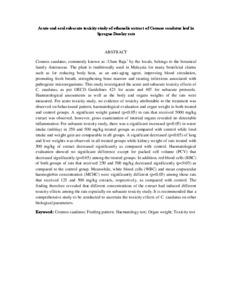Citation
Othman, Farah Amna and Hashim, Nooraain and Abdullah, Noriham and Abdul Hamid, Azizah and Rosli, Nurul Husna
(2013)
Acute and oral subacute toxicity study of ethanolic extract of Cosmos caudatus leaf in Sprague Dawley rats.
International Journal of Bioscience, Biochemistry and Bioinformatics, 3 (4).
pp. 301-305.
ISSN 2010-3638
Abstract
Cosmos caudatus, commonly known as ‘Ulam Raja’ by the locals, belongs to the botanical family Asteraceae. The plant is traditionally used in Malaysia for many beneficial claims such as for reducing body heat, as an anti-aging agent, improving blood circulation, promoting fresh breath, strengthening bone marrow and treating infections associated with pathogenic microorganisms. This study investigated the acute and subacute toxicity effects of C. caudatus, as per OECD Guidelines 423 for acute and 407 for subacute protocols. Haematological assessments as well as the body and organs weights of the rats were measured. For acute toxicity study, no evidence of toxicity attributable to the treatment was observed on behavioural pattern, haematological evaluation and organ weight in both treated and control groups. A significant weight gained (p<0.05) in rats that received 5000 mg/kg extract was observed, however, gross examination of internal organs revealed no detectable inflammation. For subacute toxicity study, there was a significant increased (p<0.05) in water intake (ml/day) in 250 and 500 mg/kg treated groups as compared with control while food intake and weight gain are comparable in all groups. A significant decreased (p<0.05) of lung and liver weights was observed in all treated groups while kidney weight of rats treated with 500 mg/kg of extract decreased significantly as compared with control. Haematological evaluation showed no significant difference except for packed cell volume (PCV) that decreased significantly (p<0.05) among the treated groups. In addition, red blood cells (RBC) of both groups of rats that received 250 and 500 mg/kg decreased significantly (p<0.05) as compared to the control group. Meanwhile, white blood cells (WBC) and mean corpuscular haemoglobin concentration (MCHC) were significantly different (p<0.05) among those rats that received 125 and 500 mg/kg extracts, respectively, as compared with control. The finding therefore revealed that different concentrations of the extract had induced different toxicity effects among the rats especially on subacute toxicity study. It is recommended that a comprehensive study to be conducted to ascertain the toxicity effects of C. caudatus on other biological parameters.
Download File
![[img]](http://psasir.upm.edu.my/30458/1.hassmallThumbnailVersion/Acute%20and%20oral%20subacute%20toxicity%20study%20of%20ethanolic%20extract%20of%20Cosmos%20caudatus%20leaf%20in%20Sprague%20Dawley%20rats.pdf)  Preview |
|
Text (Abstract)
Acute and oral subacute toxicity study of ethanolic extract of Cosmos caudatus leaf in Sprague Dawley rats.pdf
Download (52kB)
| Preview
|
|
Additional Metadata
Actions (login required)
 |
View Item |

